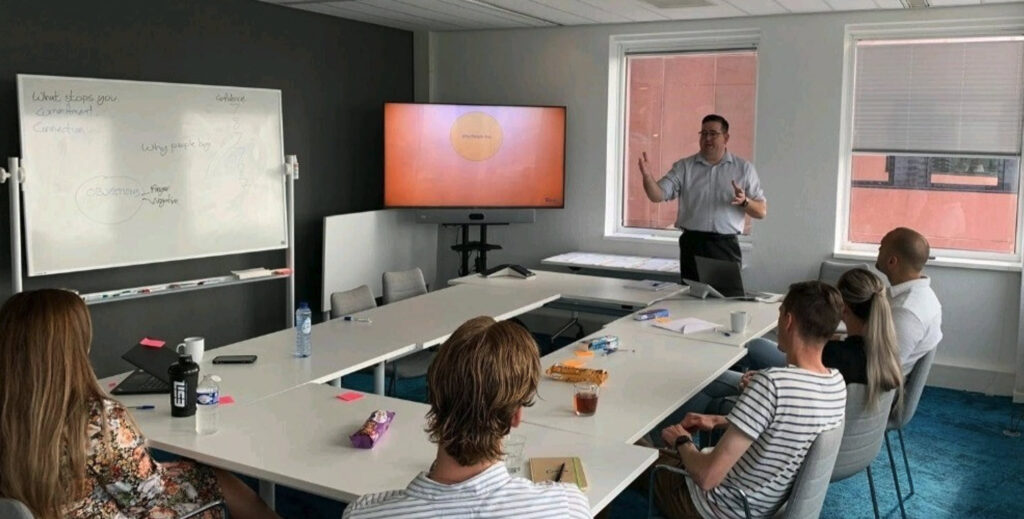What’s involved in contemporary leadership development? Andy McConville shares about training, support and other responsibilities
I’m one of the lucky ones, I really love my job. It’s fair to say that Leadership Capability isn’t often recognised, let alone invested in, when it comes to outsourcers, so I am privileged to be trusted with the opportunity to develop leaders. And, as readers of TJ know, it’s absolutely the right thing to do.
Admittedly, growing up, I didn’t necessarily dream that one day I would be a Leadership Development Manager, but my dad often said, and still does, that he always saw me working with people, bringing them together in some way. Quite a sweeping view but, even though I say it through gritted teeth, you were right, Dad!
I’ve got three workshops this week, so I want to be the best version of myself for my delegates
I’ve quite a broad remit as Leadership Development Manager (LDM) and no week or day is the same, so I thought I’d share a couple of examples to show how varied the role can be.
A delivery-focused week
This is a week where I’m primarily delivering learning interventions which are focused on helping leaders overcome challenges, particularly more complex conversations. Our leadership programme is in phases, so I can deliver the sessions across our two sites consistently, then allow for some embedding activity before the next phase.
Monday starts with coffee. Well every day starts with coffee (I’m with you! -Ed) but especially this Monday. I’ve got three workshops this week, so I want to be the best version of myself for my delegates. I’m heading into the office to do a truncated delivery to a couple of people in the morning. I think it’s important to practise and test content, and I encourage all facilitators to hear themselves out loud, saying all of messages aligned to the learning outcomes.
I really love developing content, so I’ve been doing a lot of research, but I always want the theory and science to work in a practical way for our leadership team.
Tuesday I’m up at 5.30am and have a session at 10am. It’s my choice to do a long day so I can stay at home Monday. I’ll be away for the three following days, leaving my wife and two-year-old… so it’s all about priorities!
Tuesday to Thursday is all delivery, still the favourite element of my role. Helping people make connections and apply their learning through robust practice is a buzz. I love it when learners can recognise an opportunity to apply face-to-face classroom or remote learning to what they do in their day job.
Friday allows for some reflection on how it’s all going. What did the sessions tell me about where the Leadership Development Programme goes next? What did the learners tell me about where they want to go next? I’ll also get my admin and expenses sorted – less of a buzz, but very important to do.
A week with no training
When I’m not delivering, I’ll likely be developing content and consulting with the operating teams. I might also be carrying out embedding activity. When it comes to embedding, in earlier roles this had been left to the operation – the teams and departments doing the work. They would then get told they were the reason a solution wasn’t working because they weren’t carrying out our recommendation.
What does the L&D industry think? What do similar organisations experience? Who’s doing the research? Who’s applied the science?
I reflected on how unfair this was, and it certainly did not have the ethos of ‘practical solutions’. My boss has shown me a different approach, which has really expanded my thinking and approach in general across the learning cycle. Even when you think you know a subject or know enough to cover the gap, I think it’s important to review, research and validate that thought process. What does the L&D industry think? What do similar organisations experience? Who’s doing the research? Who’s applied the science? And to top this off, this is also about me learning, while supporting my learners.
This is where I often tend to overthink. Discovering something I did not know or exploring new thinking has led to me overloading sessions in the past. All for the right intent to share, but it’s my responsibility to control that flow of information. Which is why you’ll see me refer to the word ‘phase’. This is why these weeks are essential: I can isolate content, I can practise how it would sound, and I can see if it’s something the leadership team would buy into.
It might sound a little strange, coming from a learning professional of 20 years, but I did not always enjoy designing. I can say that my love for this part of the learning cycle has really elevated, especially when I’m collaborating with others. I work closely with our design team and include input from those without an L&D background. Got to get those perspectives!
I can be much more consultative in my design approach in this role which was not always the case, and this is why I think my perspective has changed.
Another part of my role is to help and support our less experienced learning professionals, so I’ll design and deliver sessions for trainer development as well as observe and provide coaching. I work closely with the training team leaders and will bespoke any content I can to help in this specific area. It helps keep me grounded, remembering where I cut my teeth in learning. Watching our induction trainers reminds me of the diverse challenges they can face, and this team is hungry to enhance their facilitation skills. I love collaborating with them, they’re like sponges and I can barely keep up with providing them with more developmental ‘stuff’.
What’s not floating my boat
I learnt early in my career not to look for the perfect role, so I’m pretty accepting that some stuff must be done, but I won’t necessarily enjoy doing it. I do try to learn from these tasks.
I do not enjoy the documentation or producing training notes. Part of this is governance, so it is important and useful to others who may have to learn the content, but I’ll do anything to put it off.
I’m also not a fan of the admin tasks: setting up courses, inviting tracking, dashboarding and so on.
Other work
I’m helping set up our external learning function. Yes, in a flooded market of outsourced learning solutions, including leadership development, sales training, learning tech… the list goes on. We’re exploring a commercial solution to share what we do. It’s how we’ll do it which will help us carve out our place. Already this has given me the opportunity to go to Holland and deliver some training, so watch this space!
You learn a lot about your facilitation skills when you are delivering to people when English is their second language. A career low was having my spelling corrected by one of my Dutch delegates – I think I styled it out though!
We’re implementing a Learning Management System, something the organisation has not had before. This is another example of the investment in learning, and I’m providing input and consulting where needed.
I’m also involved with mentoring and reverse mentoring with L&D professionals, coaches and people who are looking to progress their careers. I’ve got a great network and I always come away from these interactions having learnt something new, helped someone focus or refocus, or all of the above.
Finally, I’m working on a meet-and-greet session, and I had the absolute privilege of supporting the World of Learning event in Birmingham in October.
Read more from the Week In The Life Of series!
Andy McConville is Leadership Development Manager at ResQ






